University Report: Social Factors Influencing Dementia Patient Care
VerifiedAdded on 2022/08/26
|10
|2121
|17
Report
AI Summary
This report investigates the key social issues influencing health and social care, with a specific focus on the delivery of proactive care to vulnerable adults, particularly dementia patients. It begins with an executive summary highlighting the widespread nature of dementia and the impact of social and motivational factors on caregivers. The report delves into the role of social and motivational factors in health, the importance of social support networks, and the detrimental effects of lacking such support. It discusses the social stigma surrounding dementia, which often leads to delayed care and the need for increased emotional and psychological support for both patients and caregivers. The report emphasizes the burdens faced by caregivers, including stress and fatigue, and how social support programs can alleviate these challenges. It also explores the negative impacts of lacking support on both caregivers and patients, leading to reduced care quality and potential psychological issues. The report concludes with recommendations for interventions targeting both patients and caregivers, such as building social support systems, providing psychological interventions like cognitive behavioral therapy, and utilizing cognitive assistive technologies and social robots to enhance patient care and reduce caregiver burden. The report underscores the importance of proactive measures to improve the quality of life for dementia patients and their caregivers.

Running head:NURSING
Care for Dementia Patients
Name of the Student
Name of the University
Author Note
Care for Dementia Patients
Name of the Student
Name of the University
Author Note
Paraphrase This Document
Need a fresh take? Get an instant paraphrase of this document with our AI Paraphraser
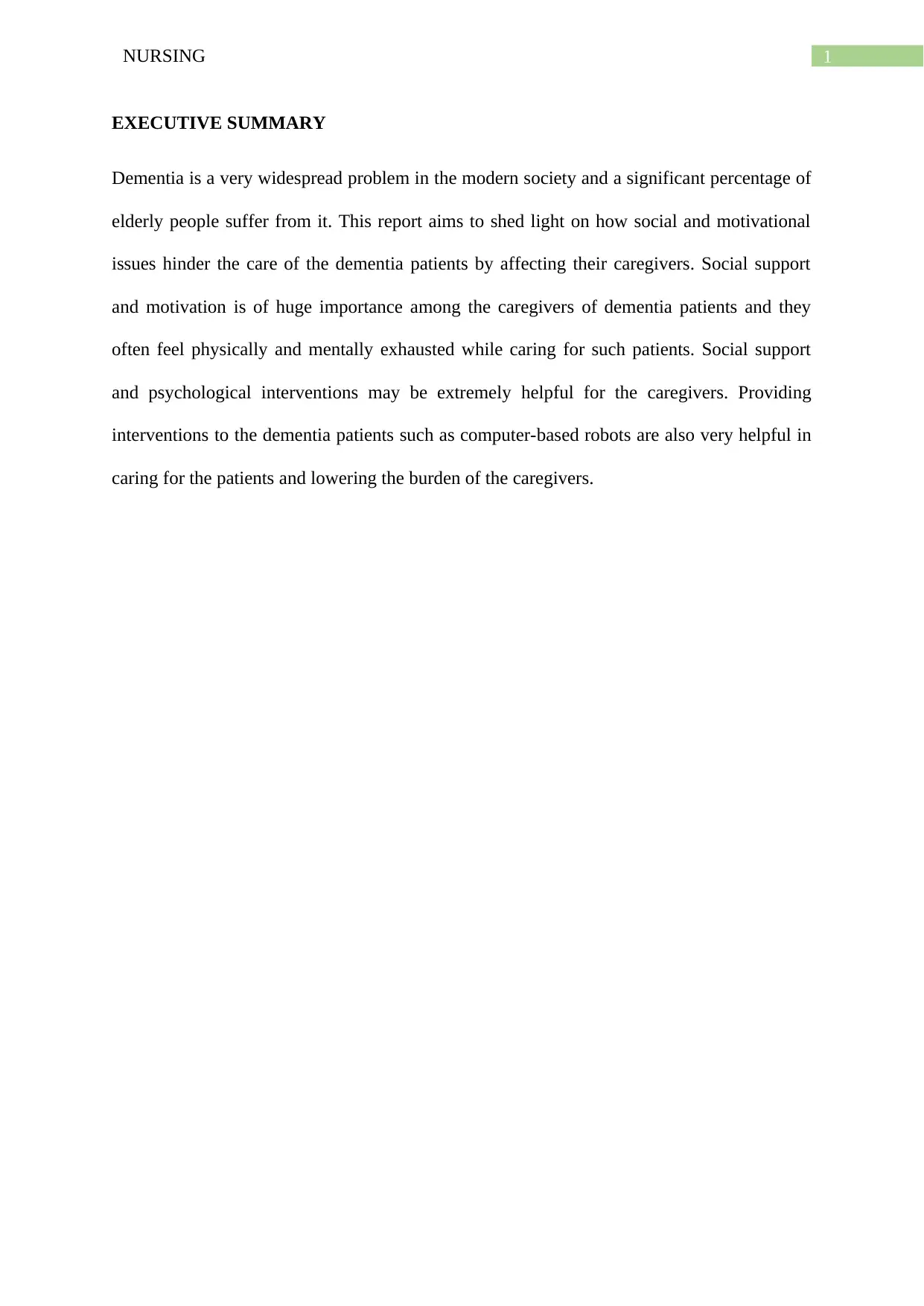
1NURSING
EXECUTIVE SUMMARY
Dementia is a very widespread problem in the modern society and a significant percentage of
elderly people suffer from it. This report aims to shed light on how social and motivational
issues hinder the care of the dementia patients by affecting their caregivers. Social support
and motivation is of huge importance among the caregivers of dementia patients and they
often feel physically and mentally exhausted while caring for such patients. Social support
and psychological interventions may be extremely helpful for the caregivers. Providing
interventions to the dementia patients such as computer-based robots are also very helpful in
caring for the patients and lowering the burden of the caregivers.
EXECUTIVE SUMMARY
Dementia is a very widespread problem in the modern society and a significant percentage of
elderly people suffer from it. This report aims to shed light on how social and motivational
issues hinder the care of the dementia patients by affecting their caregivers. Social support
and motivation is of huge importance among the caregivers of dementia patients and they
often feel physically and mentally exhausted while caring for such patients. Social support
and psychological interventions may be extremely helpful for the caregivers. Providing
interventions to the dementia patients such as computer-based robots are also very helpful in
caring for the patients and lowering the burden of the caregivers.

2NURSING
Table of Contents
Introduction................................................................................................................................3
Discussion..................................................................................................................................3
Role of Social Motivational Factors in Health.......................................................................3
Role of Social Support Networks...........................................................................................4
Lack of Support Networks Impact on Health........................................................................5
Recommendations......................................................................................................................5
Conclusion..................................................................................................................................6
Reference....................................................................................................................................8
Table of Contents
Introduction................................................................................................................................3
Discussion..................................................................................................................................3
Role of Social Motivational Factors in Health.......................................................................3
Role of Social Support Networks...........................................................................................4
Lack of Support Networks Impact on Health........................................................................5
Recommendations......................................................................................................................5
Conclusion..................................................................................................................................6
Reference....................................................................................................................................8
⊘ This is a preview!⊘
Do you want full access?
Subscribe today to unlock all pages.

Trusted by 1+ million students worldwide
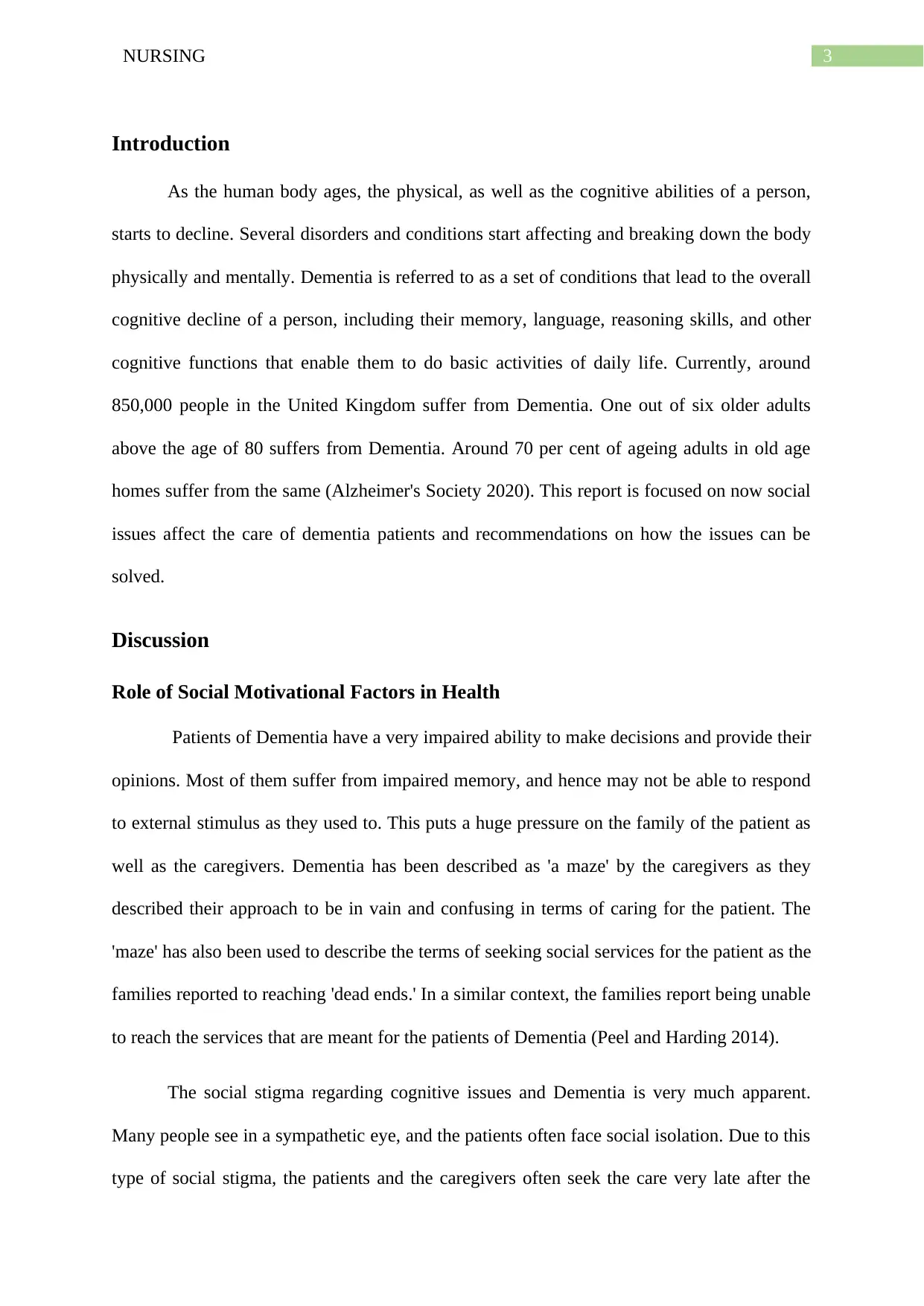
3NURSING
Introduction
As the human body ages, the physical, as well as the cognitive abilities of a person,
starts to decline. Several disorders and conditions start affecting and breaking down the body
physically and mentally. Dementia is referred to as a set of conditions that lead to the overall
cognitive decline of a person, including their memory, language, reasoning skills, and other
cognitive functions that enable them to do basic activities of daily life. Currently, around
850,000 people in the United Kingdom suffer from Dementia. One out of six older adults
above the age of 80 suffers from Dementia. Around 70 per cent of ageing adults in old age
homes suffer from the same (Alzheimer's Society 2020). This report is focused on now social
issues affect the care of dementia patients and recommendations on how the issues can be
solved.
Discussion
Role of Social Motivational Factors in Health
Patients of Dementia have a very impaired ability to make decisions and provide their
opinions. Most of them suffer from impaired memory, and hence may not be able to respond
to external stimulus as they used to. This puts a huge pressure on the family of the patient as
well as the caregivers. Dementia has been described as 'a maze' by the caregivers as they
described their approach to be in vain and confusing in terms of caring for the patient. The
'maze' has also been used to describe the terms of seeking social services for the patient as the
families reported to reaching 'dead ends.' In a similar context, the families report being unable
to reach the services that are meant for the patients of Dementia (Peel and Harding 2014).
The social stigma regarding cognitive issues and Dementia is very much apparent.
Many people see in a sympathetic eye, and the patients often face social isolation. Due to this
type of social stigma, the patients and the caregivers often seek the care very late after the
Introduction
As the human body ages, the physical, as well as the cognitive abilities of a person,
starts to decline. Several disorders and conditions start affecting and breaking down the body
physically and mentally. Dementia is referred to as a set of conditions that lead to the overall
cognitive decline of a person, including their memory, language, reasoning skills, and other
cognitive functions that enable them to do basic activities of daily life. Currently, around
850,000 people in the United Kingdom suffer from Dementia. One out of six older adults
above the age of 80 suffers from Dementia. Around 70 per cent of ageing adults in old age
homes suffer from the same (Alzheimer's Society 2020). This report is focused on now social
issues affect the care of dementia patients and recommendations on how the issues can be
solved.
Discussion
Role of Social Motivational Factors in Health
Patients of Dementia have a very impaired ability to make decisions and provide their
opinions. Most of them suffer from impaired memory, and hence may not be able to respond
to external stimulus as they used to. This puts a huge pressure on the family of the patient as
well as the caregivers. Dementia has been described as 'a maze' by the caregivers as they
described their approach to be in vain and confusing in terms of caring for the patient. The
'maze' has also been used to describe the terms of seeking social services for the patient as the
families reported to reaching 'dead ends.' In a similar context, the families report being unable
to reach the services that are meant for the patients of Dementia (Peel and Harding 2014).
The social stigma regarding cognitive issues and Dementia is very much apparent.
Many people see in a sympathetic eye, and the patients often face social isolation. Due to this
type of social stigma, the patients and the caregivers often seek the care very late after the
Paraphrase This Document
Need a fresh take? Get an instant paraphrase of this document with our AI Paraphraser
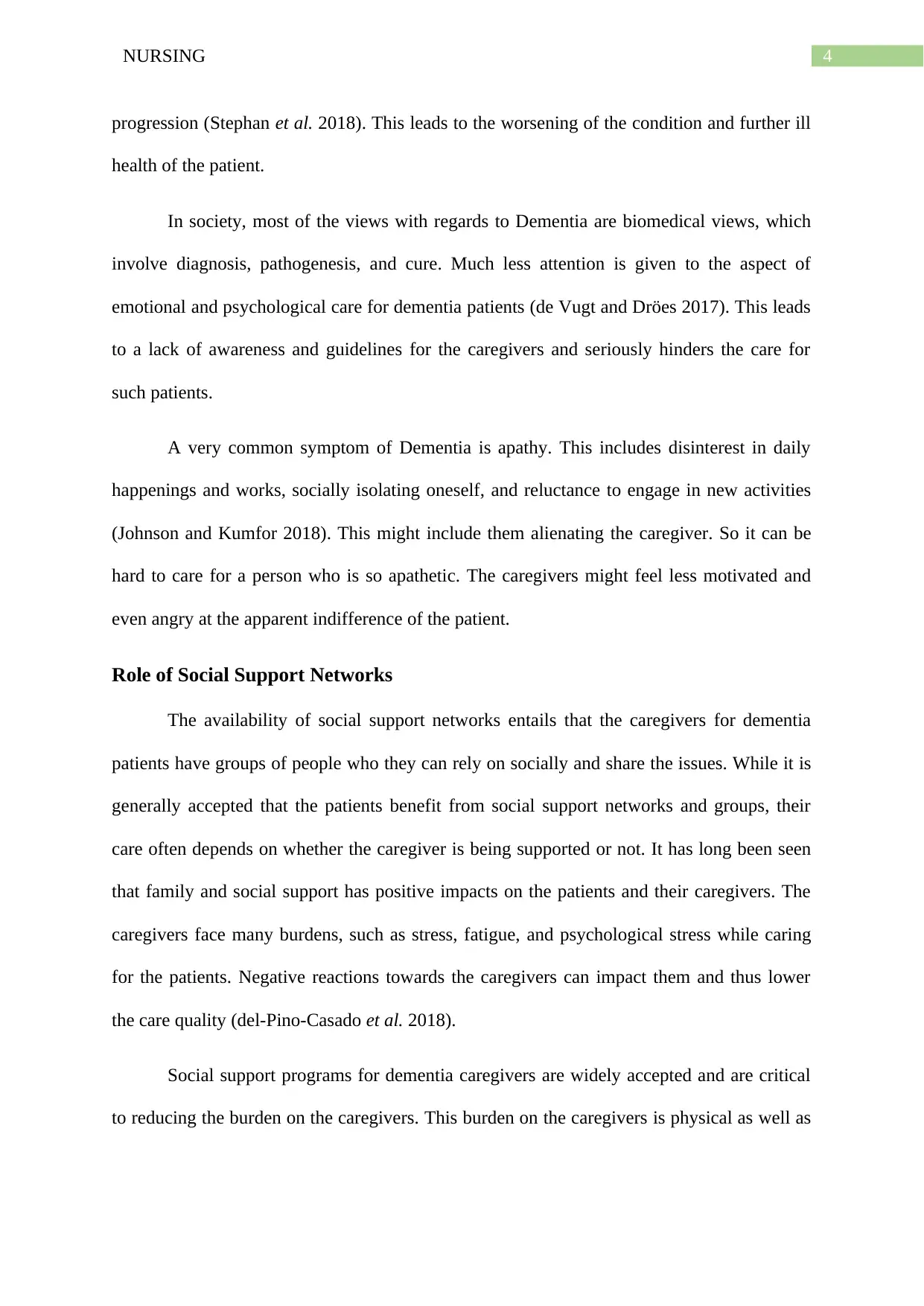
4NURSING
progression (Stephan et al. 2018). This leads to the worsening of the condition and further ill
health of the patient.
In society, most of the views with regards to Dementia are biomedical views, which
involve diagnosis, pathogenesis, and cure. Much less attention is given to the aspect of
emotional and psychological care for dementia patients (de Vugt and Dröes 2017). This leads
to a lack of awareness and guidelines for the caregivers and seriously hinders the care for
such patients.
A very common symptom of Dementia is apathy. This includes disinterest in daily
happenings and works, socially isolating oneself, and reluctance to engage in new activities
(Johnson and Kumfor 2018). This might include them alienating the caregiver. So it can be
hard to care for a person who is so apathetic. The caregivers might feel less motivated and
even angry at the apparent indifference of the patient.
Role of Social Support Networks
The availability of social support networks entails that the caregivers for dementia
patients have groups of people who they can rely on socially and share the issues. While it is
generally accepted that the patients benefit from social support networks and groups, their
care often depends on whether the caregiver is being supported or not. It has long been seen
that family and social support has positive impacts on the patients and their caregivers. The
caregivers face many burdens, such as stress, fatigue, and psychological stress while caring
for the patients. Negative reactions towards the caregivers can impact them and thus lower
the care quality (del-Pino-Casado et al. 2018).
Social support programs for dementia caregivers are widely accepted and are critical
to reducing the burden on the caregivers. This burden on the caregivers is physical as well as
progression (Stephan et al. 2018). This leads to the worsening of the condition and further ill
health of the patient.
In society, most of the views with regards to Dementia are biomedical views, which
involve diagnosis, pathogenesis, and cure. Much less attention is given to the aspect of
emotional and psychological care for dementia patients (de Vugt and Dröes 2017). This leads
to a lack of awareness and guidelines for the caregivers and seriously hinders the care for
such patients.
A very common symptom of Dementia is apathy. This includes disinterest in daily
happenings and works, socially isolating oneself, and reluctance to engage in new activities
(Johnson and Kumfor 2018). This might include them alienating the caregiver. So it can be
hard to care for a person who is so apathetic. The caregivers might feel less motivated and
even angry at the apparent indifference of the patient.
Role of Social Support Networks
The availability of social support networks entails that the caregivers for dementia
patients have groups of people who they can rely on socially and share the issues. While it is
generally accepted that the patients benefit from social support networks and groups, their
care often depends on whether the caregiver is being supported or not. It has long been seen
that family and social support has positive impacts on the patients and their caregivers. The
caregivers face many burdens, such as stress, fatigue, and psychological stress while caring
for the patients. Negative reactions towards the caregivers can impact them and thus lower
the care quality (del-Pino-Casado et al. 2018).
Social support programs for dementia caregivers are widely accepted and are critical
to reducing the burden on the caregivers. This burden on the caregivers is physical as well as
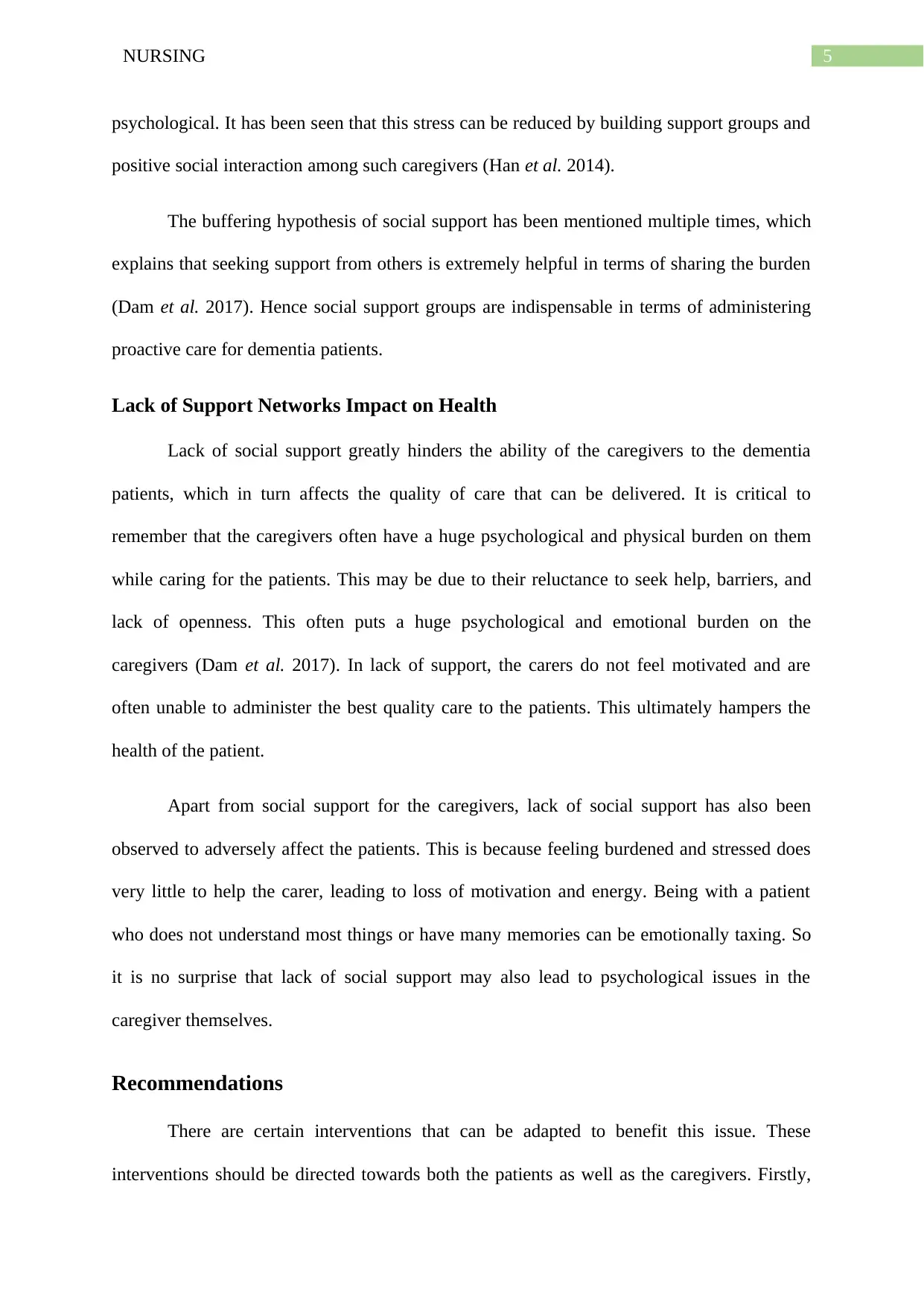
5NURSING
psychological. It has been seen that this stress can be reduced by building support groups and
positive social interaction among such caregivers (Han et al. 2014).
The buffering hypothesis of social support has been mentioned multiple times, which
explains that seeking support from others is extremely helpful in terms of sharing the burden
(Dam et al. 2017). Hence social support groups are indispensable in terms of administering
proactive care for dementia patients.
Lack of Support Networks Impact on Health
Lack of social support greatly hinders the ability of the caregivers to the dementia
patients, which in turn affects the quality of care that can be delivered. It is critical to
remember that the caregivers often have a huge psychological and physical burden on them
while caring for the patients. This may be due to their reluctance to seek help, barriers, and
lack of openness. This often puts a huge psychological and emotional burden on the
caregivers (Dam et al. 2017). In lack of support, the carers do not feel motivated and are
often unable to administer the best quality care to the patients. This ultimately hampers the
health of the patient.
Apart from social support for the caregivers, lack of social support has also been
observed to adversely affect the patients. This is because feeling burdened and stressed does
very little to help the carer, leading to loss of motivation and energy. Being with a patient
who does not understand most things or have many memories can be emotionally taxing. So
it is no surprise that lack of social support may also lead to psychological issues in the
caregiver themselves.
Recommendations
There are certain interventions that can be adapted to benefit this issue. These
interventions should be directed towards both the patients as well as the caregivers. Firstly,
psychological. It has been seen that this stress can be reduced by building support groups and
positive social interaction among such caregivers (Han et al. 2014).
The buffering hypothesis of social support has been mentioned multiple times, which
explains that seeking support from others is extremely helpful in terms of sharing the burden
(Dam et al. 2017). Hence social support groups are indispensable in terms of administering
proactive care for dementia patients.
Lack of Support Networks Impact on Health
Lack of social support greatly hinders the ability of the caregivers to the dementia
patients, which in turn affects the quality of care that can be delivered. It is critical to
remember that the caregivers often have a huge psychological and physical burden on them
while caring for the patients. This may be due to their reluctance to seek help, barriers, and
lack of openness. This often puts a huge psychological and emotional burden on the
caregivers (Dam et al. 2017). In lack of support, the carers do not feel motivated and are
often unable to administer the best quality care to the patients. This ultimately hampers the
health of the patient.
Apart from social support for the caregivers, lack of social support has also been
observed to adversely affect the patients. This is because feeling burdened and stressed does
very little to help the carer, leading to loss of motivation and energy. Being with a patient
who does not understand most things or have many memories can be emotionally taxing. So
it is no surprise that lack of social support may also lead to psychological issues in the
caregiver themselves.
Recommendations
There are certain interventions that can be adapted to benefit this issue. These
interventions should be directed towards both the patients as well as the caregivers. Firstly,
⊘ This is a preview!⊘
Do you want full access?
Subscribe today to unlock all pages.

Trusted by 1+ million students worldwide
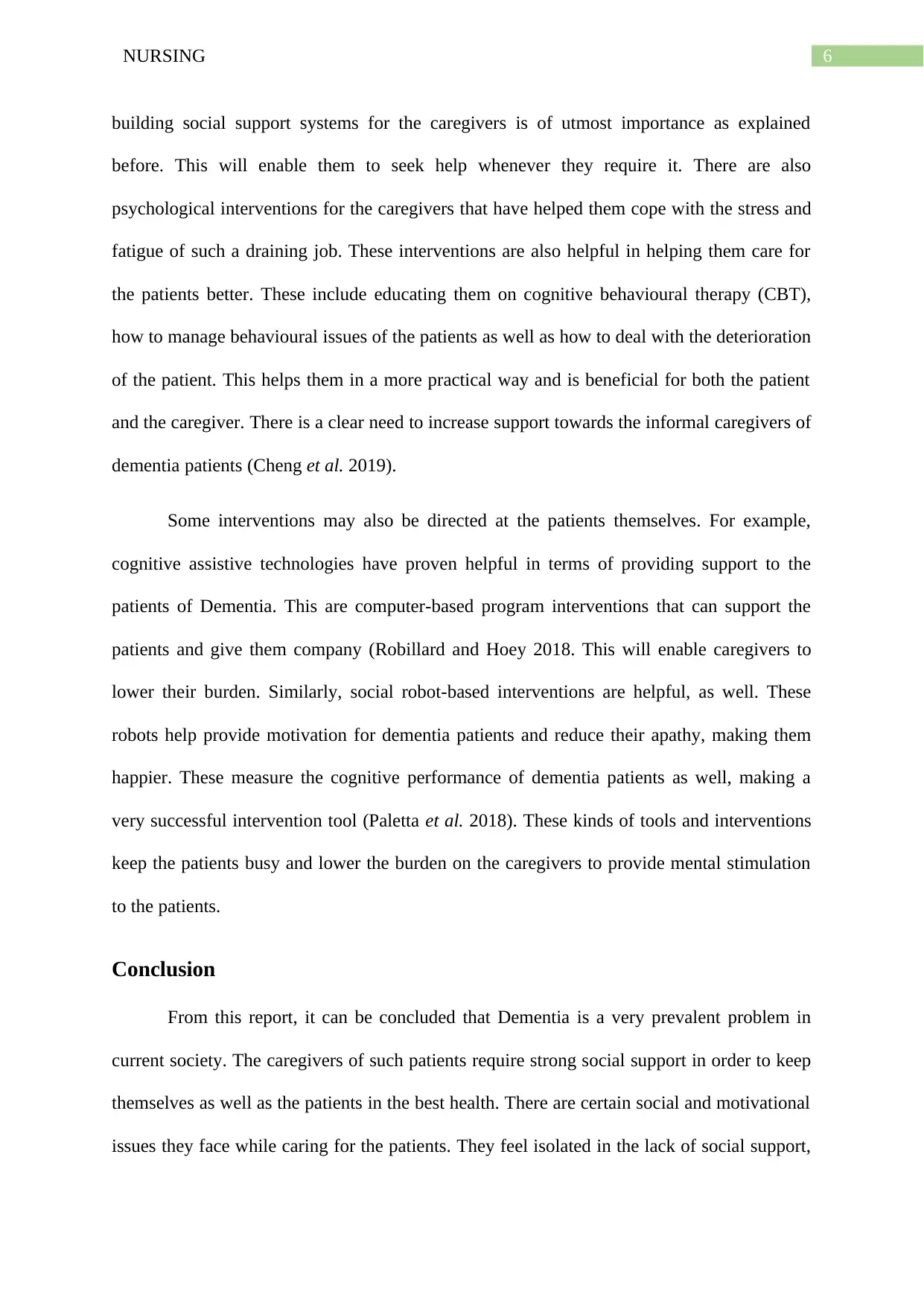
6NURSING
building social support systems for the caregivers is of utmost importance as explained
before. This will enable them to seek help whenever they require it. There are also
psychological interventions for the caregivers that have helped them cope with the stress and
fatigue of such a draining job. These interventions are also helpful in helping them care for
the patients better. These include educating them on cognitive behavioural therapy (CBT),
how to manage behavioural issues of the patients as well as how to deal with the deterioration
of the patient. This helps them in a more practical way and is beneficial for both the patient
and the caregiver. There is a clear need to increase support towards the informal caregivers of
dementia patients (Cheng et al. 2019).
Some interventions may also be directed at the patients themselves. For example,
cognitive assistive technologies have proven helpful in terms of providing support to the
patients of Dementia. This are computer-based program interventions that can support the
patients and give them company (Robillard and Hoey 2018. This will enable caregivers to
lower their burden. Similarly, social robot-based interventions are helpful, as well. These
robots help provide motivation for dementia patients and reduce their apathy, making them
happier. These measure the cognitive performance of dementia patients as well, making a
very successful intervention tool (Paletta et al. 2018). These kinds of tools and interventions
keep the patients busy and lower the burden on the caregivers to provide mental stimulation
to the patients.
Conclusion
From this report, it can be concluded that Dementia is a very prevalent problem in
current society. The caregivers of such patients require strong social support in order to keep
themselves as well as the patients in the best health. There are certain social and motivational
issues they face while caring for the patients. They feel isolated in the lack of social support,
building social support systems for the caregivers is of utmost importance as explained
before. This will enable them to seek help whenever they require it. There are also
psychological interventions for the caregivers that have helped them cope with the stress and
fatigue of such a draining job. These interventions are also helpful in helping them care for
the patients better. These include educating them on cognitive behavioural therapy (CBT),
how to manage behavioural issues of the patients as well as how to deal with the deterioration
of the patient. This helps them in a more practical way and is beneficial for both the patient
and the caregiver. There is a clear need to increase support towards the informal caregivers of
dementia patients (Cheng et al. 2019).
Some interventions may also be directed at the patients themselves. For example,
cognitive assistive technologies have proven helpful in terms of providing support to the
patients of Dementia. This are computer-based program interventions that can support the
patients and give them company (Robillard and Hoey 2018. This will enable caregivers to
lower their burden. Similarly, social robot-based interventions are helpful, as well. These
robots help provide motivation for dementia patients and reduce their apathy, making them
happier. These measure the cognitive performance of dementia patients as well, making a
very successful intervention tool (Paletta et al. 2018). These kinds of tools and interventions
keep the patients busy and lower the burden on the caregivers to provide mental stimulation
to the patients.
Conclusion
From this report, it can be concluded that Dementia is a very prevalent problem in
current society. The caregivers of such patients require strong social support in order to keep
themselves as well as the patients in the best health. There are certain social and motivational
issues they face while caring for the patients. They feel isolated in the lack of social support,
Paraphrase This Document
Need a fresh take? Get an instant paraphrase of this document with our AI Paraphraser

7NURSING
and hence, it is imperative that interventions are directing towards lowering their burden.
This may include support. Education, psychological intervention as well as interventions
towards the patients. This will help the caregivers provide the best quality care for dementia
patients.
and hence, it is imperative that interventions are directing towards lowering their burden.
This may include support. Education, psychological intervention as well as interventions
towards the patients. This will help the caregivers provide the best quality care for dementia
patients.
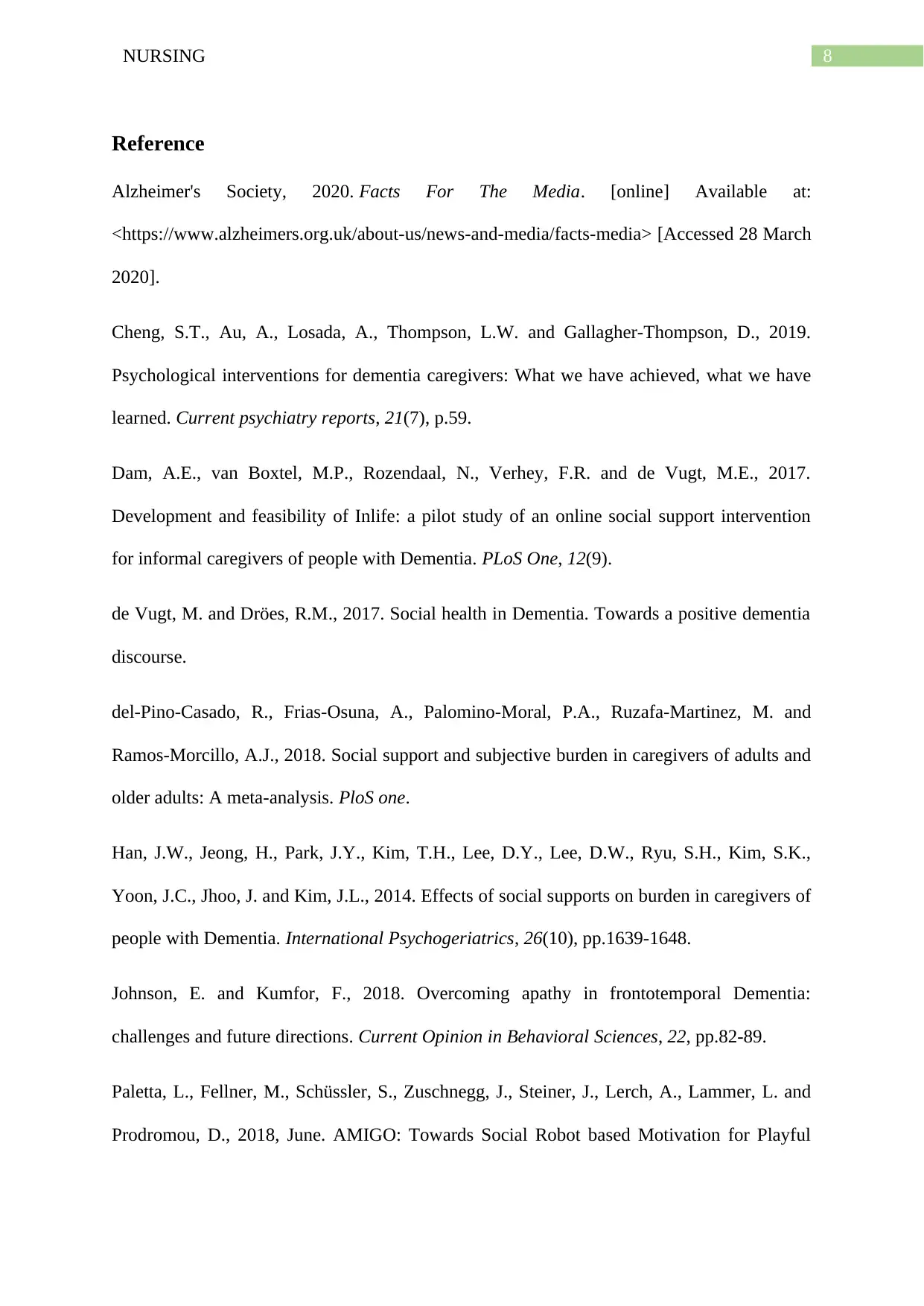
8NURSING
Reference
Alzheimer's Society, 2020. Facts For The Media. [online] Available at:
<https://www.alzheimers.org.uk/about-us/news-and-media/facts-media> [Accessed 28 March
2020].
Cheng, S.T., Au, A., Losada, A., Thompson, L.W. and Gallagher-Thompson, D., 2019.
Psychological interventions for dementia caregivers: What we have achieved, what we have
learned. Current psychiatry reports, 21(7), p.59.
Dam, A.E., van Boxtel, M.P., Rozendaal, N., Verhey, F.R. and de Vugt, M.E., 2017.
Development and feasibility of Inlife: a pilot study of an online social support intervention
for informal caregivers of people with Dementia. PLoS One, 12(9).
de Vugt, M. and Dröes, R.M., 2017. Social health in Dementia. Towards a positive dementia
discourse.
del-Pino-Casado, R., Frias-Osuna, A., Palomino-Moral, P.A., Ruzafa-Martinez, M. and
Ramos-Morcillo, A.J., 2018. Social support and subjective burden in caregivers of adults and
older adults: A meta-analysis. PloS one.
Han, J.W., Jeong, H., Park, J.Y., Kim, T.H., Lee, D.Y., Lee, D.W., Ryu, S.H., Kim, S.K.,
Yoon, J.C., Jhoo, J. and Kim, J.L., 2014. Effects of social supports on burden in caregivers of
people with Dementia. International Psychogeriatrics, 26(10), pp.1639-1648.
Johnson, E. and Kumfor, F., 2018. Overcoming apathy in frontotemporal Dementia:
challenges and future directions. Current Opinion in Behavioral Sciences, 22, pp.82-89.
Paletta, L., Fellner, M., Schüssler, S., Zuschnegg, J., Steiner, J., Lerch, A., Lammer, L. and
Prodromou, D., 2018, June. AMIGO: Towards Social Robot based Motivation for Playful
Reference
Alzheimer's Society, 2020. Facts For The Media. [online] Available at:
<https://www.alzheimers.org.uk/about-us/news-and-media/facts-media> [Accessed 28 March
2020].
Cheng, S.T., Au, A., Losada, A., Thompson, L.W. and Gallagher-Thompson, D., 2019.
Psychological interventions for dementia caregivers: What we have achieved, what we have
learned. Current psychiatry reports, 21(7), p.59.
Dam, A.E., van Boxtel, M.P., Rozendaal, N., Verhey, F.R. and de Vugt, M.E., 2017.
Development and feasibility of Inlife: a pilot study of an online social support intervention
for informal caregivers of people with Dementia. PLoS One, 12(9).
de Vugt, M. and Dröes, R.M., 2017. Social health in Dementia. Towards a positive dementia
discourse.
del-Pino-Casado, R., Frias-Osuna, A., Palomino-Moral, P.A., Ruzafa-Martinez, M. and
Ramos-Morcillo, A.J., 2018. Social support and subjective burden in caregivers of adults and
older adults: A meta-analysis. PloS one.
Han, J.W., Jeong, H., Park, J.Y., Kim, T.H., Lee, D.Y., Lee, D.W., Ryu, S.H., Kim, S.K.,
Yoon, J.C., Jhoo, J. and Kim, J.L., 2014. Effects of social supports on burden in caregivers of
people with Dementia. International Psychogeriatrics, 26(10), pp.1639-1648.
Johnson, E. and Kumfor, F., 2018. Overcoming apathy in frontotemporal Dementia:
challenges and future directions. Current Opinion in Behavioral Sciences, 22, pp.82-89.
Paletta, L., Fellner, M., Schüssler, S., Zuschnegg, J., Steiner, J., Lerch, A., Lammer, L. and
Prodromou, D., 2018, June. AMIGO: Towards Social Robot based Motivation for Playful
⊘ This is a preview!⊘
Do you want full access?
Subscribe today to unlock all pages.

Trusted by 1+ million students worldwide
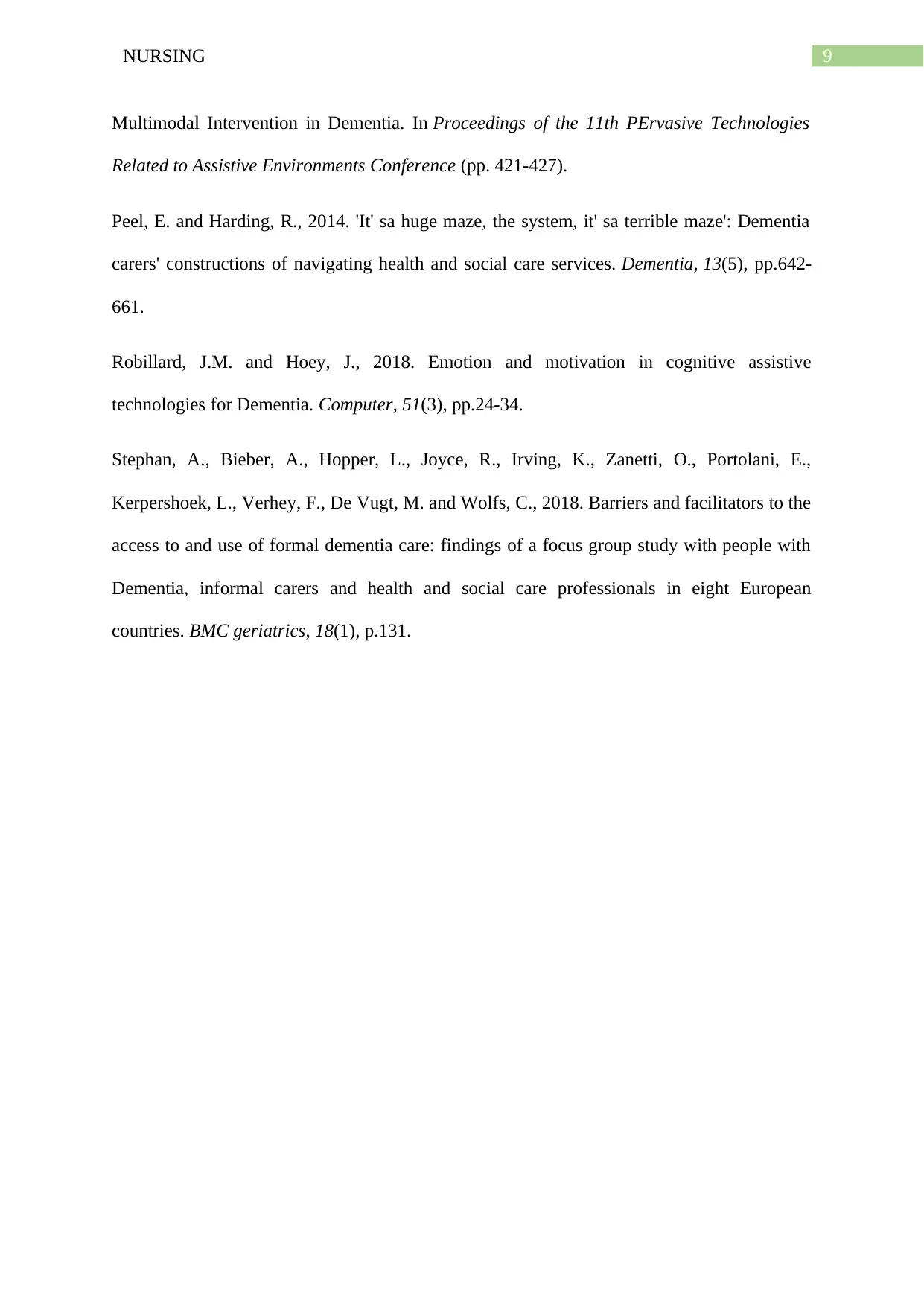
9NURSING
Multimodal Intervention in Dementia. In Proceedings of the 11th PErvasive Technologies
Related to Assistive Environments Conference (pp. 421-427).
Peel, E. and Harding, R., 2014. 'It' sa huge maze, the system, it' sa terrible maze': Dementia
carers' constructions of navigating health and social care services. Dementia, 13(5), pp.642-
661.
Robillard, J.M. and Hoey, J., 2018. Emotion and motivation in cognitive assistive
technologies for Dementia. Computer, 51(3), pp.24-34.
Stephan, A., Bieber, A., Hopper, L., Joyce, R., Irving, K., Zanetti, O., Portolani, E.,
Kerpershoek, L., Verhey, F., De Vugt, M. and Wolfs, C., 2018. Barriers and facilitators to the
access to and use of formal dementia care: findings of a focus group study with people with
Dementia, informal carers and health and social care professionals in eight European
countries. BMC geriatrics, 18(1), p.131.
Multimodal Intervention in Dementia. In Proceedings of the 11th PErvasive Technologies
Related to Assistive Environments Conference (pp. 421-427).
Peel, E. and Harding, R., 2014. 'It' sa huge maze, the system, it' sa terrible maze': Dementia
carers' constructions of navigating health and social care services. Dementia, 13(5), pp.642-
661.
Robillard, J.M. and Hoey, J., 2018. Emotion and motivation in cognitive assistive
technologies for Dementia. Computer, 51(3), pp.24-34.
Stephan, A., Bieber, A., Hopper, L., Joyce, R., Irving, K., Zanetti, O., Portolani, E.,
Kerpershoek, L., Verhey, F., De Vugt, M. and Wolfs, C., 2018. Barriers and facilitators to the
access to and use of formal dementia care: findings of a focus group study with people with
Dementia, informal carers and health and social care professionals in eight European
countries. BMC geriatrics, 18(1), p.131.
1 out of 10
Related Documents
Your All-in-One AI-Powered Toolkit for Academic Success.
+13062052269
info@desklib.com
Available 24*7 on WhatsApp / Email
![[object Object]](/_next/static/media/star-bottom.7253800d.svg)
Unlock your academic potential
Copyright © 2020–2026 A2Z Services. All Rights Reserved. Developed and managed by ZUCOL.




